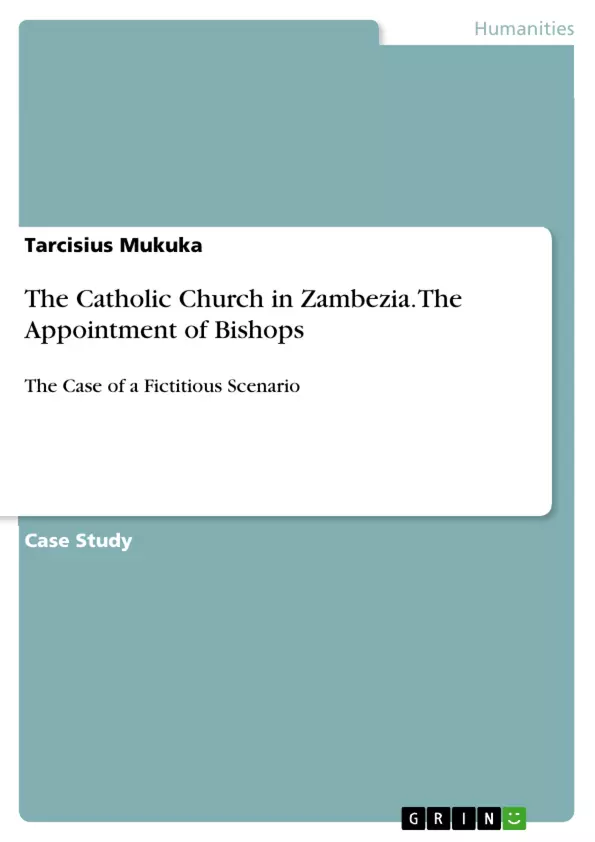This satirical article examines the case of the fictitious suspension of a Catholic priest, John Mwanyenga of Kabuchende parish in Ulufyengo archdiocese in the fictional country of Zambezia. Its main characters are all fictitious and any similarity to actual historical persons and places are purely coincidental designed to explore in depth the use of hard power in the Catholic Church. The aim of the article is to shine a spotlight on a too often occurrence in the Catholic Church in the relationship between priests and bishop which involves a miscarriage of justice. This issue is closely linked with the secretive and archaic method of appointing Catholic bishops destined to lead Catholic dioceses.
Inhaltsverzeichnis (Table of Contents)
- Introduction
- The Object of Power is Power
- Defining Soft Power and Hard Power
- Church Power as Hard Power: Déjà Vu All Over
- The Nitty-Gritty of Ulufyengo-Gate
- Ulufyengo-Gate and the Code of Canon Law
Zielsetzung und Themenschwerpunkte (Objectives and Key Themes)
This article satirically critiques the use of hard power by Catholic bishops in a fictional scenario, arguing that it represents an abuse of authority and a departure from the Gospel message of servant leadership. It advocates for a more democratic and transparent system of appointing bishops with term limits.
- Abuse of power in the Catholic Church
- Hard power versus soft power
- The role of bishops and priests
- The importance of transparency and accountability
- The impact of social media on the Catholic Church
Zusammenfassung der Kapitel (Chapter Summaries)
- Introduction: Introduces the fictional scenario of a suspended Catholic priest in Zambezia and sets the stage for the critique of the abuse of power by Catholic bishops.
- The Object of Power is Power: Explores the concept of power in the Catholic Church, drawing comparisons to absolute monarchies and referencing George Orwell's 1984. It argues that power can corrupt and lead to an abuse of authority.
- Defining Soft Power and Hard Power: Defines soft power and hard power, contrasting them with Gospel-power and servant leadership.
- Church Power as Hard Power: Déjà Vu All Over: Discusses the suspension of a Catholic priest in the fictional Ulufyengo Archdiocese, drawing parallels to a previous incident involving the author in 1985. It criticizes the handling of the situation and the lack of transparency.
- The Nitty-Gritty of Ulufyengo-Gate: Details the author's involvement in the case and his attempts to understand the circumstances surrounding the priest's suspension. It highlights concerns about due process and the impact on the priest's reputation.
- Ulufyengo-Gate and the Code of Canon Law: Analyzes the situation in light of relevant canons of the Code of Canon Law, focusing on the protection of reputation, the process of suspension, and the potential for appeal.
Schlüsselwörter (Keywords)
This article focuses on key concepts such as hard power, soft power, servant leadership, abuse of power, transparency, accountability, the Code of Canon Law, and the suspension of priests in the Catholic Church. It highlights the tensions between traditional hierarchical structures and calls for greater democratic processes within the institution.
Frequently Asked Questions
What is the main theme of the article about Zambezia?
It is a satirical critique of the use of "hard power" and the lack of transparency in the Catholic Church's hierarchy.
What is the difference between "hard power" and "soft power" in the church?
Hard power refers to authoritarian control and suspension of priests, while soft power/Gospel power aligns with servant leadership.
What does "Ulufyengo-Gate" refer to?
A fictional scenario involving the suspension of a priest to illustrate miscarriages of justice within the ecclesiastical legal system.
What is criticized regarding the appointment of bishops?
The article criticizes the secretive and archaic methods of appointment and advocates for term limits and democratic processes.
How does the Code of Canon Law relate to the story?
The article analyzes relevant canons to highlight the protection of reputation and the potential for abuse in suspension processes.
- Arbeit zitieren
- Dr. Tarcisius Mukuka (Autor:in), 2020, The Catholic Church in Zambezia. The Appointment of Bishops, München, GRIN Verlag, https://www.grin.com/document/963981



